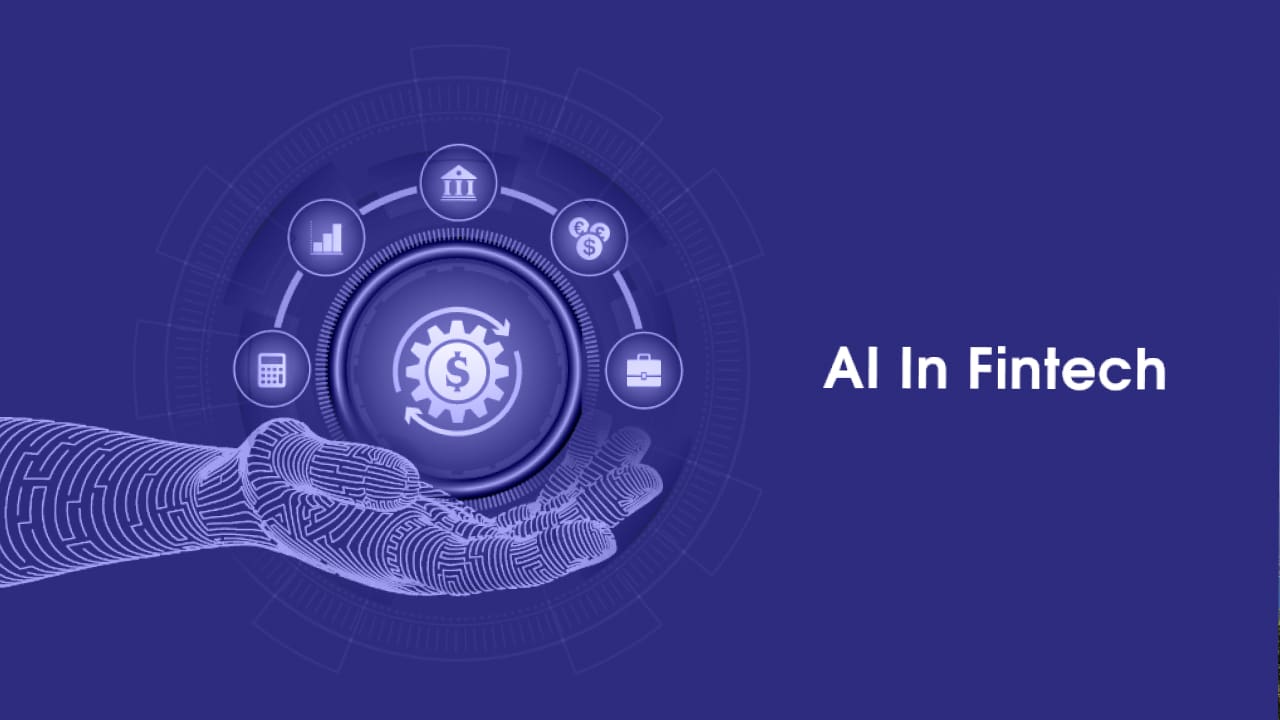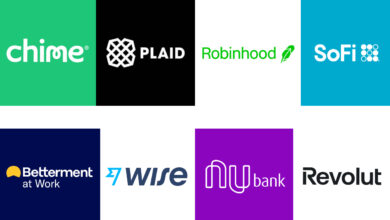Explore the Revolution by AI in Fintech in Economic Services
Mr. Gates encapsulated the transformative ethos of Fintech in the quote on how technology can and has redefined traditional systems while carrying forward the purpose. The amalgamation of Artificial Intelligence (AI) and financial technology (Fintech) is perfecting the wheel of the financial world as we know it. The entire system of money and institutional management is changing.
“Banking is necessary, banks are not.” – Bill Gates, Co-founder of Microsoft
AI has brought the capability of creating infinite knowledge to the human world. It provides system to detect and curtail fraudulent activities, customized & personalized financial advice for people and institutions based on the automation capacities to run a large amount of data in a few seconds, and predict trends.
Table of Contents
This automation has not only increased decision-making efficiency but also accessibility and innovation. Let’s dive deeper into the interconnection of ai and fintech, with Worldsultimate.
Fraud Prevention

AI, since its inception, has played a vital role in identifying malicious transactions by providing real-time analysis, understanding, and flagging patterns. This system has enhanced Machine learning (ML) models that can capture anomalies and eventually reduce the operational costs, especially within fintech apps, where fraud detection must be swift, scalable, and seamless.
AI has proven extremely effective at combating fraud by evaluating risk indicators, e.g., geolocation anomalies, fingerprint mismatches, and lack of trusted devices. Many financial platforms integrate behavioral biometrics and web monitoring to raise the flag on suspicious activities such as high-risk transfers or unusual login attempts, and proceed to block threats and anomalies.
Rules like If a transaction exceeds an $X amount, then trigger biometric verification. This helps in balancing security with an enhanced user experience. These solutions can easily adapt to any emerging data threats by refining tactics and anomaly detection.
Advanced tools use predictive machine learning and AI copilots to predict scenarios, e.g., money laundering networks, with near-perfect accuracy. However, challenges like false positives and data silos demand solutions. We can safely quote that you can use the PayPal app, which has been using AI to analyze 1.5 billion daily transactions, reducing fraud rates to 0.32% (vs. the industry average of 1.8%).
Table 1 – Impact of AI in Fraud Detection
| Metric | Traditional Systems | AI-Driven Systems |
| False Positive Rates | 30% | 10% |
| Detection Speed | Hours-Days | Milliseconds |
| Cost Savings | – | Up to 40% |
It has been analyzed that fraud detection driven through AI systems in Fintech has prompted to lower costs by up to 40% in comparison to the traditional methods. As part of comprehensive fintech courses, learners now explore how these AI-driven fraud detection systems work, equipping future professionals with the skills to develop secure and intelligent financial platforms. By merging behavioral analytics with regulatory partnerships, businesses can proactively curtail fraud and future threats.
Customer Service
AI also introduced automated chatbots that have enhanced the customer service experience. One such example is Erica – Bank of America. It handles customer inquiries, tracks their spending, and offers financial tips, all while enhancing user engagement.
Statistic: Erica serves 19 million users, and has capably resolved 70% of problems and inquiries without human intervention.
As observed, the AI-driven Chatbots have reduced customer service costs by 30%, saving banks $7.3 billion annually by 2023.
Credit Scoring and Risk Assessment
AI has introduced various methods to evaluate creditworthiness in Fintech. It uses alternative data such as rent payments, utility bills, social media activity, and even educational background to create fairer, more inclusive risk profiles. The old school method would only rely on the credit history and/or the customer’s capacity to offer collateral, which often excludes “thin-file” or “no-file” applicants (e.g., immigrants, young adults, or gig workers).
AI has bridged this gap by identifying behavioral patterns and repayment potential, which were missing in non-traditional datasets. This has created access to credit cards, mortgages, and loans for a new set of customers.
For example, Upstart, which is an AI lending platform, uses machine learning to assess 1,600+ data points per applicant. This system has enhanced the approval rate by up to 27% more for borrowers than conventional methods, while reducing default rates by 75% compared to traditional banks. Similarly, the Federal Reserve found that AI-driven models reduce racial and income-based disparities in credit approvals by 40%.
It has enhanced:
- Financial Inclusion: 1.7 billion adults around the globe have no access to formal banking. AI helps lenders serve this market as well.
- Risk Mitigation: By detecting subtle details such as consistent bill payments, AI predicts defaults more accurately.
- Speed: The approval time has dropped to minutes instead of weeks.
Personalized Financial Management
AI-driven tools have completely reshaped how people manage assets by providing customized solutions to resolve any financial goal. Many platforms, such as money monitoring or financial goal/retirement planning tools, analyze spending habits to mechanize and optimize the end financial goal.
The best part is that these tools can adapt to various changes that occur throughout life, be it adjusting to a growing family or their needs. Advanced features offer AI Cash Flow planning, which can predict the specific needs of an emergency that is likely to happen with astounding accuracy.
However, this alliance comes with its unique challenges. The end user is required to maintain robust connectivity and engagement in order to keep solutions conflict-free and reliable. By adding machine learning to the tech, the tools fuel the confidence and reliability to mitigate risk and avoid any possible market volatility. Robo-advisors like Wealthfront and Betterment use AI to create customized investment
portfolios.
Market Growth: The robo-advisory market is expected to reach $9.9 billion by 2027, growing at a 31% CAGR. Research suggests that 60% of millennials prefer AI-driven financial tools over human advisors.
Algorithmic Trading

AI-powered systems are helping navigate the financial market based on specific conditions such as volatility spikes, price action, and market trend, while keeping the investment goal intact, either high-frequency or ESG-focused investing, each situation has a unique solution.
Retirement firms are now leveraging the technology to tap the opportunities and seeking different emerging market trends and capitalize on market inefficiencies. To quote an example, traders set rules like, “If oil inventories decline, increase gold holdings”. These adjustments to the algorithm adapt to any event, be it a geopolitical crisis or an earnings surprise. The traders take advantage by modifying tactics and leveraging dynamically.
Related Pick: Marketing Agency for Fintech
However, risks like herd behaviour of the algorithm or overanalyzing the historically present data can create a bias, but this issue is resolvable with machine learning and continuous data recalibration to avoid any bottlenecks while implementing AI governance frameworks. By merging technologies such as neural networks and quantum computing with human expertise in market psychology and foresight, traders can navigate the market opportunistically scenarios.
Table 2 – AI in Trading Performance
| Metric | Traditional Systems | AI-Driven Systems |
| Average Annual Return | 7-10% | 20-30% |
| Trade Execution Speed | Seconds | Microseconds |
| Error Rate | 5% | <1% |
AI has the capacity to process market data in microseconds, executing trades based on predictive analytics. Hedge funds like Renaissance Technologies use machine learning models to achieve higher annual returns, exceeding 66%.
Enhancing Regulatory Compliance (RegTech)
Regulatory compliance is an extremely important aspect of the financial world. AI automation has proven to be fully capable of compliance. It monitors the transactions for Anti-Money Laundering (AML) violations.
Statistic: AI reduces compliance costs by 50-70%, saving firms $10 billion annually. ComplyAdvantage’s AI tools screen 10 million entities daily, cutting false alerts by 60%.
Challenges and Ethical Considerations
AI in Fintech is not free of ethical dilemmas. There are data privacy risks, algorithmic bias (from biased historical data perpetuating discrimination), and opaque “black-box” decisions complicating compliance. To address these concerns, a transparent AI design is required that can be audited and regulated to prioritise and promote fairness.
Data Privacy Concerns
In order to accumulate the results, AI requires access to sensitive data, raising GDPR and CCPA compliance risks.
You Might Like to Read: Top Fintech Companies in 2025 You Should Know About
Algorithmic Bias
AI systems are trained on pre-acquired data, which can be biased. This can lead to discriminatory outcomes. For example, Amazon used an AI recruiting tool that highly favored male candidates for the positions.
Table 3 – Addressing AI Challenges
| Challenge | Mitigation Strategy |
| Data Privacy | Federated learning, encryption |
| Algorithm Bias | Diverse training data, third party audits |
| Job Displacement | Reskilling programs, AI human collaboration |
Job Displacement
The World Economic Forum has estimated that AI will bring an end to 85 million jobs by the end of 2025, but create 97 million new roles as well.
The Future of AI in Fintech

It is all changing! And change is the only inevitable happening around us. The money world and how we perceive it are already going through it.
- Hyper-Personalization: As we are at the dawn of the more enhanced version of AI, which is nuro-symbolic, it will be capable of offering personalized, real-time, context-aware financial advice tailored for the individual.
- Decentralized Finance (DeFi): AI-powered smart contracts will automate lending and insurance.
- Quantum Computing: The system enables and accelerates risk models and fraud detection.
AI is not just a tool but an era of transformation in Fintech. It will not only support institutions but also individuals in making smarter decisions, providing and getting inclusive services, and offering unmatched security.
While certain challenges like bias and privacy linger on, proactive governance and innovation will ensure that AI drives sustainable growth. As said by Cathy Wood, CEO of ARK Invest:
“AI won’t just predict the future of finance – it will design it. The only question is: Will we code it with conscience?”
You Might Like to Read: US and Global Fintech Startups
